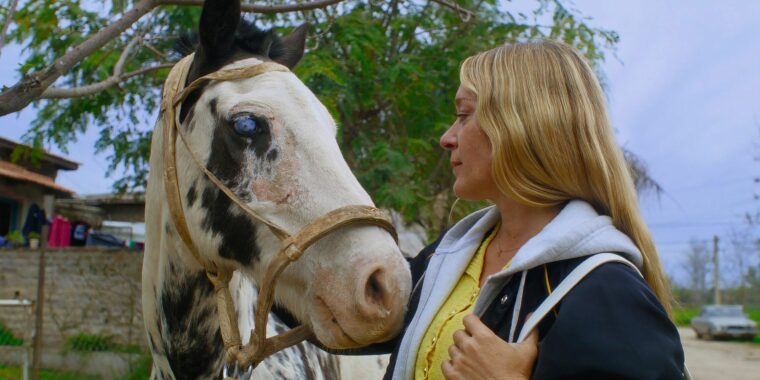



DIR: Amalia Ulman | Cast: Chloe Sevigny, Joe Apollonio, Camila del Campo, Guillermo Jacubowicz, Alex Wolff | Drama 93′
A crew from the small New York media company CL Productions descends on the rural Argentinian village of San Cristóbal to film a quirky musician who they think could provide content for their channel, which – we glean – specialises in documenting the eccentricities of Latin American culture.
But the CL crew (Edna, Justin, Jeff, Elena and Dave) is terminally chaotic and unprofessional. It’s unclear whether they have come to the right San Cristóbal – or even the right country. And when their one and only contact can’t be found they must improvise, searching for usable footage at a local talent contest whose amateurishness mirrors their own.
Signs of CL’s shambolic approach are already plain in a brief prologue which, for no obvious reason, takes place a year before the film’s main events, with the presenter, Edna, requiring numerous prompts to conduct a simple intro to camera.
Foregrounding various forms of sex and desire as the driving force for its narrative, Magic Farm has some of the classic hallmarks of farce, but without the intense logic or comedic payoffs normally associated with the genre. Although the CL crew’s air of arrested development, slapdash journalism and internecine squabbling makes it hard to warm to them, as the narrative meanders on we find out more about the individual members, and see them engaging with the locality in ways that are sometimes surprising.
Jeff – a wussy man-boy with a ketamine habit added to the usual list of susceptibilities – fixates on the sultry Manchi, daughter of Popa, a woman whose life is informed by her claimed affair with Gerard Depardieu forty years earlier. Justin conceives a crush on the rotund, avuncular receptionist of the small hotel where they’re staying. Meanwhile, Elena unsuccessfully tries to conceal the fact that she is pregnant by Edna’s husband, Dave – CL’s producer.
Some reviewers want to see Magic Farm as a biting satire on a group of ‘odious, entitled gringos’ appropriating indigenous culture, but this doesn’t really hold water. Jeff’s relationship with Manchi points up the fact that ‘exploitation’ can go in both directions. Justin is easily conned when he buys sim cards from a local store. And in the short time they spend in the village, the CL crew isn’t revealed as a cadre of closed-off, hard-nosed personalities. In fact its needy, emotionally vulnerable members function rather as a kind of dysfunctional family.
But there are problems with the characterisations. Jeff’s nebbishkeit feels stereotyped enough without his unsolicited venturing of the fact that he is Jewish. Justin’s seemingly unreciprocated infatuation with the receptionist comes out of the blue – bolted on as a plot device rather than earned by any spark we’ve witnessed between the characters.
And Chloë Sevigny’s Edna is surprisingly undercooked. She functions more as a fixed – if affectless – centre around which the others revolve than a character in her own right. And this maternal role is underlined by a surprising interaction with Jeff which provides the film’s most cringe moment.
Meanwhile, the locals remain as baffled by their antics as – I would venture – audiences will be. I wanted to be more charmed than I was by this film, which never throws off its air of slightness. Although ‘slacker farce’ may now be a thing, Magic Farm suggests that it’s not the best vehicle for engagement or entertainment. There were plenty of possibilities in this story’s premise, but the director needs to get a much firmer grip on her material to make it work.
The film is shot in a striking verité style, with some dialogue feeling improvised and a few of the performers apparently non-professionals, and it finds many attractive locations in the Argentinian village, with its colour-washed interiors and startlingly green and luxuriant foliage. @IanLong
MAGIC FARM IS IN CINEMAS 16 MAY 2025